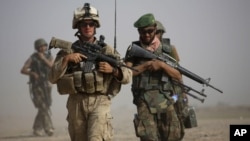One of the major foreign policy issues facing President Barack Obama during his second term in office will be winding down the conflict in Afghanistan, America’s longest war.
American military forces have been in that country for more than 11 years, longer than the Soviet presence in the 1980s [more than nine years].
There are roughly 68,000 U.S. troops in the country. The plan is to withdraw all American and international coalition combat forces from Afghanistan by the end of 2014, ultimately handing over all military and security responsibilities to the Afghans.
But former U.S. ambassador to the United Nations (2005-2006), John Bolton, believes the Afghan security forces will not be ready to take over from the Americans, and he is pessimistic about Afghanistan’s future following the U.S. pullout.
“The possibility of the U.S. actually pulling out in 2014 just brings the prospect of the Taliban taking control once again more into focus. And I think if I were predicting, I would predict that’s the most likely outcome, which is obviously an extraordinarily negative outcome from the U.S. perspective,” said Bolton. “The idea that we would withdraw, even though the near certain outcome is a Taliban/al-Qaida return to power and all the risks that that entails for the United States and other countries, I just think is a kind of blindness.”
Talks on U.S. Troop Strength After 2014
U.S. and Afghan officials are engaged in negotiations over the size of the American military presence after 2014, a presence that is expected to be significantly smaller.
Former Defense Secretary (1997-2001) William Cohen said there must be an international residual military force in Afghanistan.
“It cannot be simply the United States. There has to be a recognition on the part of many countries that it’s in the world’s interest to see stability remain or be brought to Afghanistan,” Cohen said. “If we leave and everyone leaves, then I think we have a return to the status quo ante. That’s not desirable. But the United States can’t be the only country concerned about stability in Afghanistan, so it is going to have to be an international force, if there is going to be one at all.”
For many years, one of the key demands of the United States and other Western countries was for Afghan President Hamid Karzai to fight corruption. But many former U.S. government officials, including Ambassador John Bolton, said the goal of rooting out graft was a lofty one that Karzai was unable to accomplish.
Corruption Still Rampant
“Although we’d certainly like an Afghanistan without corruption, the odds of the United States making that happen or of the Karzai regime or anybody else making it happen in a short period of time was always unrealistic,” said Bolton. “It is a fact of life there that the Afghans themselves are going to have to decide how to deal with. It might have been part of the unrealistic expectations that we had for the Afghan national government.”
Former National Security Adviser [1974-77; 1989-93], retired Air Force General Brent Scowcroft also said the United States had unrealistic expectations about what it could achieve in Afghanistan and Iraq.
“We cannot step in on a brief timetable and remake societies. We’ve tried it several times now and it’s just beyond our capability. So we have to realize, when we are contemplating action in another country, what is realistic for us to accomplish and what isn’t,” Scowcroft said. “Because both in Iraq and Afghanistan, we had these grand notions of remaking the societies and turning them into democracies, well you just can’t do that overnight. And it takes an intensity and a dedication which we can’t perpetuate, and so we need to reign in our aspirations.”
War Weariness in U.S. and Europe
General Scowcroft added there is a war weariness in the United States.
“With the Afghan war, with the Iraq hostilities, I think there is a strong sense ‘don’t get involved anymore, pull back.’ Psychologically, that can be harmful," he said. "I don’t know what there is out in the future, but going from one extreme to another is dangerous.”
Experts said there is also a war weariness in Europe, and they said this does not bode well for putting together a smaller international military force to replace the one currently in Afghanistan until the end of 2014.





